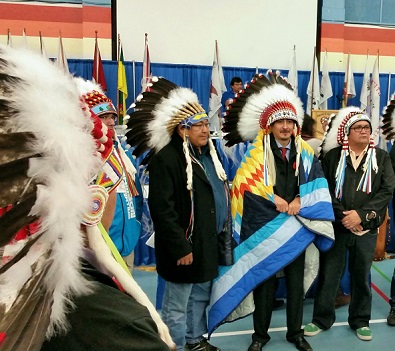Athabasca Vice-Chief Joseph Tsannie, pictured here on Oct. 27, 2015, has been involved in the hunting protocol. Photo by Chelsea Laskowski
Prince Albert Grand Council has taken a final step to put an end to last year’s issues between Dene hunters in Saskatchewan and Manitoba.
The Athabasca Harvest Protocol was passed at PAGC’s annual assembly on Monday. It was previously approved by chiefs at the Denesuline Sector Meeting in September.
The protocol came about after comments made in the media last winter by Manitoba’s Sayisi Dene, saying the Athabasca Dene were overhunting caribou.
PAGC perceived this as a negative campaign, and the words “slaughter” and “wastage” used by the Sayisi Dene didn’t sit well with the Athabasca Dene.
In reality, Athabasca Vice-Chief Joseph Tsannie said, the hunters from Saskatchewan crossed borders for their traditional hunt due to migration changes by the caribou.
“It looked like lots of hunting in one area. Before it used to be scattered,” he said.
Tsannie said it’s important to communicate between Dene groups instead of going to media, which is why a number of meetings were held between the two groups since then.
“We want to make sure that our people talk to each other and come up with solutions themselves,” he said.
That’s why the Athabasca Harvest Protocol was created in cooperation with the Manitoba Dene.
The protocol formalizes practices that many hunters were already following, Tsannie said.
“If people are going hunting in Northern Manitoba, we want our people to contact the First Nations, the host First Nations where the caribou are,” he said.
“Phone the band office, talk to the chief or the council and say you’re going into the community, you’re going to be doing the hunt in this area, maybe this is how much caribou they’re going to take.”
The protocol takes from traditional knowledge to respect cows, kill only what you need, and use all parts of the caribou.
The next steps are to find funding for different First Nations implement it. It’s important to educate young people and bring them up to par with the practices, Tsannie said.
